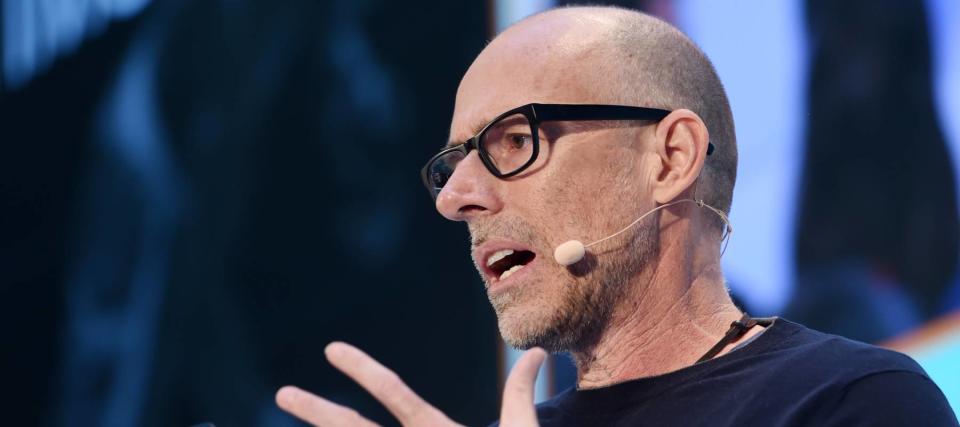'They're being naive': NYU's Scott Galloway says, unlike UPS's Teamsters, the Hollywood unions lack the leverage to strike a deal. Here's why

Scott Galloway isn’t hopeful about a swift resolution to the ongoing strikes in Hollywood.
“They’re being naive,” he said of the unions on a recent episode of New York Magazine’s Pivot podcast, which he co-hosts.
Don't miss
Rich young Americans have lost confidence in the stock market — and are betting on these 3 assets instead. Get in now for strong long-term tailwinds
36% of millionaires say it’ll ‘take a miracle’ to retire amid rising costs and a shaky market — here are the best shock-proof assets to grow your nest egg
Commercial real estate has outperformed the S&P 500 over 25 years. Here's how to diversify your portfolio without the headache of being a landlord
Around 11,500 screenwriters, represented by the Writers Guild of America, have been on strike since early May. They were joined in July by the Screen Actors Guild-American Federation of Television and Radio Artists, which boasts 160,000 members.
Meanwhile, roughly 340,000 UPS workers represented by the Teamsters union were set to go on strike as early as Aug. 1, but reached a tentative deal with the shipping giant in late July. A ratification vote is currently underway.
Galloway, a marketing professor at New York University and a well-known author, believes the key difference between the labor disputes is the amount of leverage held by the respective unions. He argues that, compared to content platforms like Netflix, UPS had much greater financial incentive to give concessions to its workers.
Lack of leverage
Netflix’s recent earnings report serves as an example that entertainment industry giants don’t seem to be feeling the pressure. The company delivered $3.29 in earnings per share during the second quarter of 2023, higher than the consensus forecast of $2.86.
The results make sense: the streaming giant says it has experienced a surge in subscribers since it started cracking down on password sharing. It also has the ability to produce content in other parts of the world while the Hollywood strikes drag on. In spite of the strikes, Netflix has expanded its cash flow to the point where management was able to contemplate billions in stock buybacks, according to its second-quarter letter to shareholders.
“If Netflix had a button that makes the strike go on for two or three years I think they would press it,” Galloway said.
Read more: Americans are spending a ridiculous $253/month more on groceries. But this simple hack can turn your stressful daily spending into a golden nest egg
By comparison, Galloway says, UPS would have started losing money right away if the Teamsters had walked out. This, he says, is why the company was willing to give in to some of the union’s demands, including higher pay, air conditioning systems in all new vehicles and the abolishment of compulsory overtime during off days.
Galloway points out the drastically different demands writers and actors are making compared to those of the Teamsters.
“The writers want the studios to not use AI and they want at least a certain number of writers in the room,” he said. “The UPS drivers … asked for an additional $2 an hour and air conditioning.”
(The tentative UPS deal in fact includes progressive wage increases totaling $7.50 per hour over five years.)
Galloway says that the writers’ demands are analogous to the Teamsters saying to management, “You can never use autonomous driving for the trucks … and in every truck there has to be two drivers.”
'Taking their industry down'
Galloway believes the writers and actors unions are in a weak position comparable to that of U.K. coal miners during their 1984-85 strike.
Spurred by the Prime Minister Margaret Thatcher government's proposed pit closures, British miners launched a strike that the government was well prepared for, having built a stockpile of coal.
“They didn’t have enough leverage to force the government to do anything, but at the same time the strike went on long enough that consumers and industry reshaped their energy needs,” Galloway said. “Even when they solved the strike, the industry came back smaller.”
As for the Hollywood unions, he said: “They are essentially taking their industry down such that late-night TV will not have nearly enough money to pay anybody, much less what the unions demand.”
What to read next
Here's how much money the average middle-class American household makes — how do you stack up?
Worried you haven’t saved enough for retirement? Here’s how to get your savings on track
How can I stop the pain and make money in this nightmarish market? Here's 1 simple way you can protect your nest egg
This article provides information only and should not be construed as advice. It is provided without warranty of any kind.

 Yahoo Finance
Yahoo Finance 